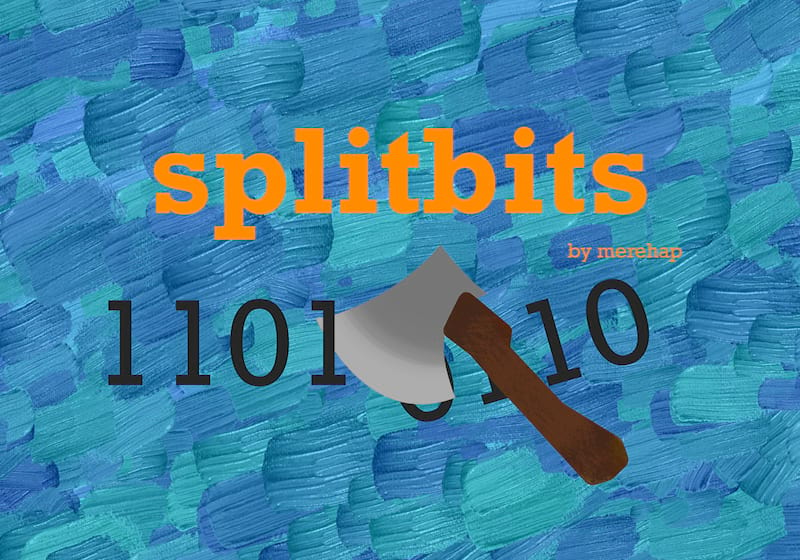3 releases
| 0.1.2 | Oct 21, 2024 |
|---|---|
| 0.1.1 | Oct 21, 2024 |
| 0.1.0 | Oct 19, 2024 |
#1995 in Rust patterns
Used in reznez
1MB
989 lines
Concise bit field extraction

Concise macros for extracting bits from integers and combining bits into integers. No scary syntax. Minimal magic.
use splitbits::splitbits;
// Parse the template ("aaabbbbb"), apply it to the input,
// then generate a struct populated with the bit field values.
let fields = splitbits!(0b11110000, "aaabbbbb");
// Single-letter field names,
// generated from the unique letters in the template above.
assert_eq!(fields.a, 0b111);
assert_eq!(fields.b, 0b10000);
Why use splitbits?
Splitbits replaces tedious, error-prone bit operations with a simple template format, making it easy to extract bits into variables.
Every operation than can be executed at compile time is. Generated code should be as efficient as hand-written bit operations.
Splitbits is intended for cases where bitfield is too heavy-weight syntactically: when you don't want to explicitly declare a new struct for data that you won't use as a return value or argument.
The four base macros
For additional examples, see each macro's page.
- splitbits! - Extract bit fields out of an integer, storing them as fields of a struct. (See example above.) By default, each field will be stored in the smallest unsigned integer type possible.
- combinebits! - Combine bits of multiple integers into a single integer.
use splitbits::combinebits; let b: u8 = 0b1010_1010; let m: u8 = 0b1111; let e: u8 = 0b0000; let result = combinebits!("bbbb bbbb mmmm eeee"); assert_eq!(result, 0b1010_1010_1111_0000); - splitbits_then_combine! - Extract bit fields from multiple integers then combine them
into a single integer.
use splitbits::splitbits_then_combine; let output = splitbits_then_combine!( 0b1111_0000, "aaaa ..bb", // input 0, input template 0, 0b1011_1111, "cc.. ....", // input 1, input template 1 "aaaa bbcc", // output template ); assert_eq!(output, 0b1111_0010); - replacebits! - Replace some of the bits of an integer with bits from other integers.
use splitbits::replacebits; let a: u16 = 0b101; let b: u8 = 0b01; // Placeholder periods in the template are the bits that will not be replaced. let result = replacebits!(0b10000001, "aaa..bb."); assert_eq!(result, 0b10100011);
Macro variants
The four base macros cover all the basic functionality that this crate offers and should be sufficient for most use-cases. However, in many situations better ergonomics can be achieved by using these more specialized macro variants.
Hexadecimal
All four base macros have equivalents that use hexadecimal digits for their templates rather than bits (binary digits). The variants are splithex!, combinehex!, splithex_then_combine!, and replacehex!.
Splitbits variants
splitbits! itself has many variants which are intended for better ergonomics for the generated variables. The basic variants are:
- splitbits_named! - Used when single-letter variable names aren't descriptive enough. This
variant returns a tuple (instead of a struct) of the resulting fields, allowing the caller to
assign individual long field names in the
letbinding. - splitbits_named_into! - Same as splitbits_named! except that the caller specifies the
types of the resulting fields, not just their names.
into()is called on each tuple field before it reaches the caller. This is useful for when the default type (the smallest integer type that will fit the field) is a smaller type than the caller would like to use, or if the caller has a newtype that they would like to use instead. - splitbits_ux! - Used when exact-width integers (e.g. u4, u7, u20) are needed, instead of just the standard types (u8, u16, u32, u64, u128, and bool). Requires the ux crate.
Documentation
Find thorough documentation of this crate and its many macro variants here, including detailed template syntax, settings, and per-macro documentation and examples.
Milestones for future versions
User-facing
- Support template bases beyond binary and hexadecimal (base 8, 32, and 64).
- Add setting for validating splitbits inputs by specifying literals in the template.
- Add file-level config for setting defaults for the overflow and min settings.
- Will allow macro invocations to be more concise at the call-site when the default settings are not desired for a project.
- Allow non-standard template lengths.
- Verify that splitbits can be used in no_std environments. It seems that the package itself doesn't need to be no_std, just the generated code.
- Add support for different endianness for inputs and outputs?
Performance
- Add tests that verify that the intended code for each macro is what is generated.
- Verify at the generated rust level.
- Verify at the assembly level
- Is the generated splitbits! struct elided or are we taking a performance hit?
- Will be difficult due to different CPU architectures and instruction sets.
- Remove all chained shift operations where possible
- Always use overflow=corrupt for combinebits! and replacebits! if the input variable size exactly matches the field slot size.
Code quality
- Represent output as a syntax tree before final code generation.
- Will enable cleaner generated code.
- Will enable better optimization for generated code.
- Will make adding new features easier.
- Will improve code clarity and decrease bugginess by disentangling separate concerns.
- Will fix bug where combinebits input types must not be larger than the template type.
- Extract argument parsing from business logic.
- Will improve code clarity and error handling.